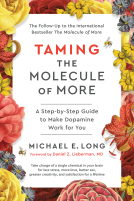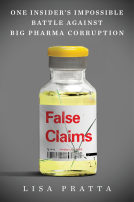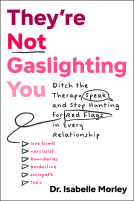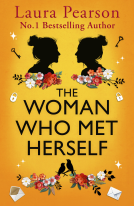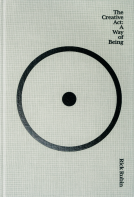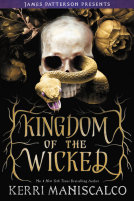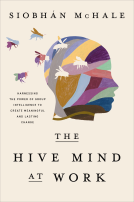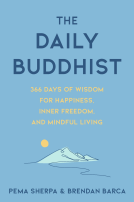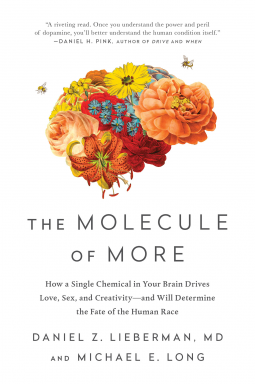
The Molecule of More
How a Single Chemical in Your Brain Drives Love, Sex, and Creativity—and Will Determine the Fate of the Human Race
by Daniel Z. Lieberman, MD; Michael E. Long
This title was previously available on NetGalley and is now archived.
Send NetGalley books directly to your Kindle or Kindle app
1
To read on a Kindle or Kindle app, please add kindle@netgalley.com as an approved email address to receive files in your Amazon account. Click here for step-by-step instructions.
2
Also find your Kindle email address within your Amazon account, and enter it here.
Pub Date Aug 14 2018 | Archive Date Jun 06 2022
Talking about this book? Use #TheMoleculeOfMore #NetGalley. More hashtag tips!
Description
Why are we obsessed with the things we want only to be bored when we get them?
Why is addiction perfectly logical to an addict?
Why does love change so quickly from passion to indifference?
Why are some people die-hard liberals and others hardcore conservatives?
Why are we always hopeful for solutions even in the darkest times—and so good at figuring them out?
The answer is found in a single chemical in your brain: dopamine. Dopamine ensured the survival of early man. Thousands of years later, it is the source of our most basic behaviors and cultural ideas—and progress itself.
Dopamine is the chemical of desire that always asks for more—more stuff, more stimulation, and more surprises. In pursuit of these things, it is undeterred by emotion, fear, or morality. Dopamine is the source of our every urge, that little bit of biology that makes an ambitious business professional sacrifice everything in pursuit of success, or that drives a satisfied spouse to risk it all for the thrill of someone new. Simply put, it is why we seek and succeed; it is why we discover and prosper. Yet, at the same time, it’s why we gamble and squander.
From dopamine’s point of view, it’s not the having that matters. It’s getting something—anything—that’s new. From this understanding—the difference between possessing something versus anticipating it—we can understand in a revolutionary new way why we behave as we do in love, business, addiction, politics, religion—and we can even predict those behaviors in ourselves and others.
In The Molecule of More: How a Single Chemical in Your Brain Drives Love, Sex, and Creativity—and will Determine the Fate of the Human Race, George Washington University professor and psychiatrist Daniel Z. Lieberman, MD, and Georgetown University lecturer Michael E. Long present a potentially life-changing proposal: Much of human life has an unconsidered component that explains an array of behaviors previously thought to be unrelated, including why winners cheat, why geniuses often suffer with mental illness, why nearly all diets fail, and why the brains of liberals and conservatives really are different.
Available Editions
| EDITION | Other Format |
| ISBN | 9781946885111 |
| PRICE | $26.95 (USD) |
| PAGES | 240 |
Links
Featured Reviews
This is a very interesting book about dopamine and all the different ways it affects our brain and so our behavior also. Many of the things written here are already well known, and not only to me, but there where some interesting connections made by the author between dopamine and personality, and then creativity and genius that were particularly illuminating. The best thing is that the book is easily written and gives a lot of examples.
Questo é un libro molto interessante che parla di dopamina e di tutti i molteplici modi in cui influisce sul nostro cervello e quindi sul nostro comportamento. Molte delle cose qui scritte sono note da tempo e non solo a me, ma ci sono alcune interessanti connessioni fatte dagli autori tra la dopamina e la personalitá, la creativitá e il genio che ho trovato particolarmente illuminanti. La caratteristica migliore del libro comunque, risiede nel fatto che é scritto in modo chiaro e semplice e fornisce un sacco di esempi.
THANKS NETGALLEY FOR THE PREVIEW!
 Reviewer 238609
Reviewer 238609
*The Molecule of More : How a Single Chemical in your Brain Drives Love, Sex, and Creativity-and will Determine the Fate of the Human Race* by Daniel Z. Lieberman, MD and Michael E. Long explains how dopamine impacts our lives from wanting a new car to impacting creativity.
I enjoyed this book. It spoke in easy to follow language that wasn't too scientific. My favorite chapter was the last as we are shown how to effectively use dopamine and not let us always be searching for a dopamine high, but instead be able to use it to our advantage.
I would recommend this book to anyone who is interested in the impact dopamine has on our every day lives.
I would like to thank Netgalley and the publisher for providing me with a review copy in exchange for my honest and unbiased opinion of it.
Great interesting and scientific read! This book goes into great detail about dopamine and how it affects our bodies from various parts of our lives. It is a great read for those who have studied this build, yet is also laid out simply enough that those not familiar with brain study would likely be easily engaged as well.
 Annette J, Reviewer
Annette J, Reviewer
A fascinating book , written in a clear, concise style designed to appeal to all readers regardless of their background or pre-existing knowledge of the topic.
Dopamine is a truly fascinating chemical , produced by our own bodies, it is involved in many things ranging from sexual attraction to drug addiction, as well as creativity and mental illness. As the author says " Our dopamine circuits are what make us human. They are what give our species its special power. We think. We plan. We imagine. We elevate our thoughts to ponder abstract concepts such as truth, justice and beauty. Within those circuits we transcend all barriers of space and time. We thrive in the most hostile environments thanks to our ability to dominate the world around us. But these same circuits can also lead us down a darker path, a path of addiction, betrayal and misery. "
I found the way the authors broke down the subject into a series of topics worked well, each chapter flowed smoothly into the next, building on the ground covered in the one before, to create an educational and informative text that inspires the reader to look at the world around them through new eyes as they come to understand the impact of this tiny chemical compound on so many aspects of their daily lives. The focus throughout the book ranges from the personal such as love and addiction, to the more far reaching when they examine how dopamine influences things like political affiliation .
A fascinating and engaging read that had me hooked from the very first page.
I read and reviewed an ARC courtesy of NetGalley and the publisher, all opinions are my own.
 Educator 250756
Educator 250756
Interesting, accessible study of the link between dopamine and behavior.
Favorite chapters were on Creativity and Politics.
I received an ARC in exchange for an honest review.
 Shelly H, Reviewer
Shelly H, Reviewer
Once I started reading The Molecule of More I couldn’t put it down. I was engrossed. The book is both engaging and informative. The Molecule of More dives into dopamine’s role in human behavior in a comprehensive and captivating manner. Dopamine is a chemical that is never really satisfied. It eagerly waits in anticipation of more. It has little regard for morality, emotions, rationality or how much one already has, subsequently propelling us to chase more…. sometimes for good and sometimes for not so good. If you want to understand how this neurochemical influences our everyday basic behavior or are curious about dopaminergic personality, start with this book. It’s well-written and compelling.
 Brittany M, Educator
Brittany M, Educator
I really enjoyed this book. I think the combination of scientific explanation, case studies/examples, and illustrations makes it highly accessible to someone who doesn’t necessarily have a lot of experience with more scientific texts. I also really like the way the book is divided into different categories of objects/items that humans might desire to talk about the way dopamine and neurology shape our urges. I will very likely use this text.
Thank you to NetGalley, BenBella Books, Daniel Z. Lieberman and Michael E. Long for an ebook copy for review. As always, an honest review from me.
I learned so much from this book. It was absolutely fascinating!
We’ve all heard about dopamine. It interacts with the reward centers in the brain and explains why we keep seeking more and more. Even when we’re already happy. I learned even more about dopamine and the role it plays in so many more experience than I realized. From solving problems and dreaming, struggles in relationships, political affiliations, and even from an evolutionary standpoint.
The beginning was more an explanation of how dopamine functions and the role in the brain. It was a necessary foundation, but not particularly fascinating. The rest of the chapters were much more interesting. However I didn’t completely agree with everything. Neurotransmitters definitely play a role in human behavior. The studies even prove it. But there is some element of human choice that the book doesn’t discuss. We’re human beings and not just a bunch of chemicals and electrical activity.
Overall, a fascinating look at the role dopamine has on human behavior. Learned a lot and even found myself stopping to read aloud interesting passages to the people around me.
 Bharath R, Reviewer
Bharath R, Reviewer
This is a very interesting book on how just one chemical – Dopamine influences so much of our behaviour. The undue influence Dopamine exerts is amazing considering the fraction the Dopamine circuit occupies in our brains. This is a well written book and very informative as well.
The crux of our behaviour boils down to two outlooks we humans have – here & now matters (which the authors refer to as the H&N circuit) and the future (our desires and actions). Dopamine is largely what determines how we approach the future – high dopamine defining the drive. Dopamine circuits are in two categories – ones which determine our desires and the other which exerts control over our actions.
Responsible action is a delicate balance – excessive dopamine activity can become impractical and is speculated at times even lead to mental illnesses. The influence of Dopamine on politics, sex, relationships, emotions, political affiliations, religion and business is all discussed in a good amount of detail.
This is a book I certainly recommend, though it could have been crisper in the early and middle portions.
My rating: 4.5 / 5.
 T N, Reviewer
T N, Reviewer
This is a highly recommended book for people who wants to know more about what dopamine does in our brain. I really love the first part where the author described a boy-girl relationship, how it started and ended, and how dopamine plays a part in their brains throughout the relationship. The next few chapters may not be as catchy in terms of using analogy but this does not discount the weight of the content. There were experiments describing how dopamine and other neurotransmitters work in our body and I'm intrigued with the dream part. I tried the experiment about the dream, how thinking of a problem can help solve through dreams in the night, but it didn't work for me. I shared this with my friends and it worked for them. So I guess I just conducted the experiment myself! Anyway, I enjoy this book a lot. I am better informed now!
I'm a teacher from a family of teachers and scientists whose interests cross paths on books like these. Suffice it to say, I've read a lot of popular science books. There are usually three questions to keep in mind when reading this type of book:
1. Is the book an engaging read? For this, I'd give the book an A+. It is an extremely quick and smooth read, and I love the hypothetical stories woven in that illustrate the concepts.
2. Is the book actionable? Does it actually change the reader's behavior? A+ This is easily one of the most actionable books I've ever read. The authors make a good case for the fact that knowing about dopamine should be able to help you with everything from your diet to your relationships to, if you're lucky, turning the dopamine down a little and using those "here and now" brain chemicals to enjoy moments with your kids. All of those have actually happened, which really helps this book rise above the average book in its category.
3. Does the book actually capture the science and research that is out there? For this, I have mixed feelings that average out to a B. On the dopamine-related research, it's still an A+. But when other types of research and stats are brought in, it felt like the authors reached a bit too far to draw conclusions. This was especially true when talking about political differences. Not sure the "conservatives" cheering on Trump's immigration policies have any overlap with the church groups handing out food and water to immigrants crossing the border.
 Amanda D, Reviewer
Amanda D, Reviewer
A fascinating look at how dopamine affects your brain. Really interesting!
Many thanks to NetGalley, the publisher, and the author for my ARC. All opinions are my own.
 Roger R, Educator
Roger R, Educator
Engrossing exploration of neurotransmitters and behavior.
Neurobiology is a discipline that has interested me for years. Apparently, research on dopamine frames its importance in human behavior, because we are the known species with greater segregation of this chemical and therefore significantly defines certain behaviors. The authors distinguish how our brain uses certain "Here & Now neurotransmitters" to be empathetic, to bond emotionally in the long term and connect better with our emotions and the present moment. And on the other hand, how dopamine drives intelligence, imagination and creativity, participates in the pursuit of future goals, desires and dreams, keeps us motivated even to work hard to maximize future resources, and by suppressing the H&N emotion allows us to keep “cool head" in chaotic situations.
Very interestingly the authors explain that the "dopamine desire circuit" can lead us to evade reality, the use of force, fraud, and on the other hand the use of some very addictive substances because they cause the euphoria dopaminergic and self-efficacy efects. It is therefore important to mature the "dopamine control circuit" and develop the H&N circuit to balance and readjust consequences of alternate choices. I could not stop reading the Domination chapter, in which ADHD is mentioned as a result of dopamine weak control. Also, they indicate the existence of a genetic component of a dopaminergic character, characterized by excessive dopamine in the desire circuit, related with creative geniuses and also with schizophrenia and other mental illness.
As an educator, facilitator and coach, to better understand these neural circuits and the associated behaviors has been very useful and of great importance to have a neuroscientific basis of the specific problems that my clients face. The "dopamine desire circuit" promotes behaviours that can hijack an endless cycle of "Do to have", fall prey to our own endless desires, addicted to achievement without being able to experience fulfillment. In addition, I think this may partly explain the increasing rate of depression and loneliness at epidemic levels in America.
Therefore, it is fundamental to mature and develop the "control circuit" in order to manage between both circuits and give balance to our lives. One of the activities that has helped me balance my dopaminergenic and my clients' abilities is the art therapy and developing our natural capacity for mindfulness, self-knowledge, enjoy what we do and create, value what we are and have, strengthen our bonds. Some ways to balance the dopaminergic dominance in synergy with the H&N circuit proposed by the authors is creativity combined with sensory experience, for example handicrafts (Waldorf education includes many of these activities for the development of children), coloring books, making music, cooking, gardening, playing sports. "It takes both dopamine and H&N to attain happiness, ... a mixture that can set us down the path to a more balanced way of being human".
Readers who liked this book also liked:
Pema Sherpa; Brendan Barca
Nonfiction (Adult), Religion & Spirituality, Self-Help
